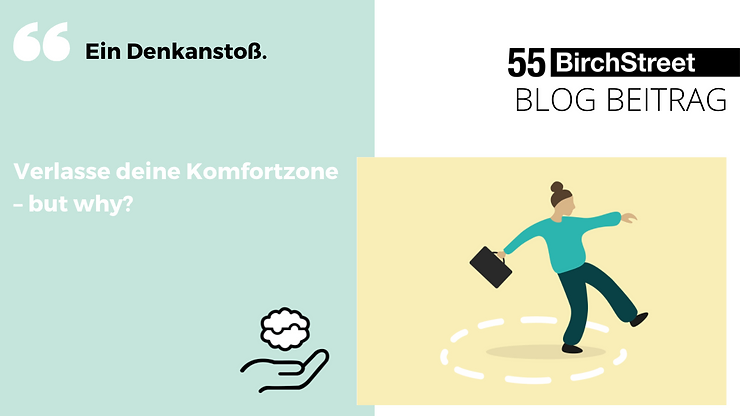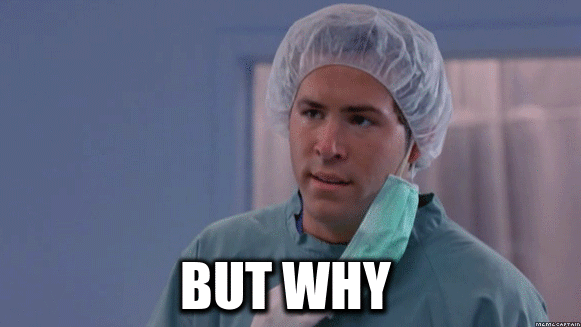
Especially young professionals like to use the sentence “Leave your comfort zone” —

First of all, let's imagine this figuratively. We would have the comfort zone, the learning zone and the panic zone, which continue to fan out from the fluffy core of the comfortable area. True to the names, the corresponding content is hidden behind them.
Die comfort zone can be explained quite simply: This means the area that is familiar to us — in which it feels good and quite comfortable. These include the routine tasks, the daily repetitive to-dos and the exchange with the most friendly of the well-known colleagues. In this zone, we are in run-only mode.
You can, but then you stop developing and slow down your potential, which can also affect your job sooner or later.
The comfort zone is followed by Learning zone, in which we are increasingly facing new challenges and are aware of potential risks. For each individual, the limits that are crossed when entering the learning zone are subjectively very different. This could be a call with colleagues from abroad, which demands that you dig out the rusty English again, or the upcoming workshop, the moderation of which really triggers head vertebrae just thinking about it.
Especially against the backdrop of fast pace, new working environments, changing requirements and the VUCA world, it is essential to enter the learning zone regularly in order to be successful. Not only successful in the traditional sense - climbing career levels and earning a lot of money - but much more important: being able and aware of the self-confidence to master situations well.
However, this feeling and experiences only arise in the learning zone, because unlike in your comfort zone, you don't think and act in familiar patterns here. You will learn to absorb new impulses and perspectives, let go of fears and react flexibly and confidently to challenges in the future.
Watch out: Life is full of unexpected learning zones, which we sometimes just stumble into! But anyone who is afraid of getting out of their cozy, cuddly comfort zone and into a learning zone develops “avoidance strategies” in order to avoid them in a targeted manner. But just like hurdles: That costs energy and strength, which you could better invest in further development.
You probably know that: Just overcoming the first hurdle and looking outside the box, a new challenge comes around the corner, which can trigger a similar chaos of thought.
Sweats, trembling knees and palpitations? Welcome to the third zone, the panic zone, which triggers stress. Here, the environment and processes are completely alien and may even appear hostile. This could be, for example, status reporting to the management of a large corporation or a meeting with international division managers. But this zone is also important for gaining new experiences, learning from mistakes and expanding your own spectrum and knowledge and exploiting your potential. However, you should feel as “comfortable” as possible so that you can better deal with feelings of being overwhelmed. Constantly leaving your comfort zone can drain and make you tired. This is because the permanent release of the stress hormone cortisol can lead to long-term health consequences.
The fact is that there is no ONE comfort zone. Therefore, the basic requirement is to be honest with yourself. Reflecting helps: Did I actually cancel the last event at which I could have given a keynote speech because I didn't find time for it or simply because I was simply afraid of it? Was I really too busy for the virtual network party two weeks ago or was I simply dreading small talk with strangers?
There are certainly a number of situations in your previous professional life that need to be reflected on here. In the end, it is important that you do not develop any patterns in your behavior and that you do not define the limits within your comfort zone too narrowly. It doesn't get easier over time, but harder if your own motives aren't honestly evaluated.
If things challenge us too much, this can frustrate us and the desired growth will not be achieved. On the contrary, staying in the comfort zone quickly becomes boring and stagnation sets in. It is precisely in the area between comfort zone and panic zone that learning and growth can take place. It is therefore important to know your own motives and limits in order to find your own learning zone.
Let's take tips to try out using small talk and networking, for example. For some, this may mean stress, others do it with their left hand. The good thing is: It's getting easier from time to time. Just start, use your comfort zone from another area to venture into the study zone in the area where you leave your comfort zone. So if you are panicked about networking or talking in front of larger groups, the first step is to choose a topic that you know well and start with a small group of people.
Good news: You can also make yourself comfortable in the comfort zone from time to time, so don't forget to charge your energy battery in your personal comfort zone. The next chance to try something new is sure to come.
And then it's time again, ready, go — if you don't dare, you won't win. And anyway: The future belongs to the brave.
Do you have a question or would you like to find out how we can work together?
Feel free to contact us here or via linkedin with us — we'd love to hear from you